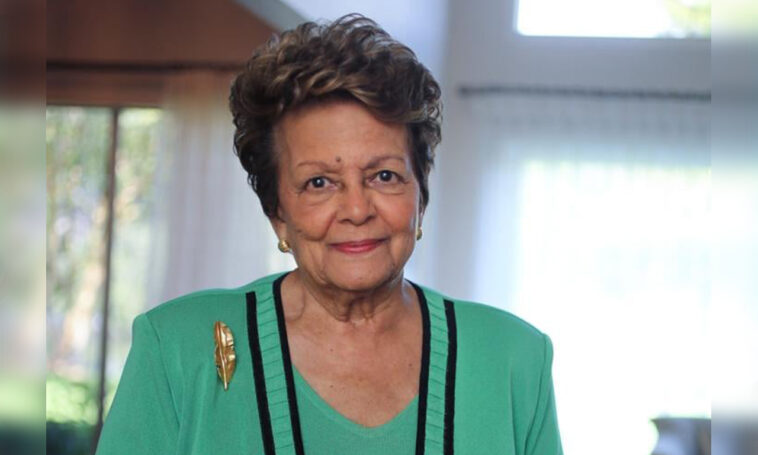Sybil Haydel Morial, a prominent civil rights leader, and a revered figure in New Orleans history, has passed away at the age of 91. As the widow of Ernest “Dutch” Morial, New Orleans’ first Black mayor, and the mother of former mayor Marc Morial, her death marks the end of an era for a family deeply intertwined with the city’s political and social fabric. Her passing was announced on Wednesday in a statement by the National Urban League, where her son, Marc Morial, serves as president and CEO. The statement did not disclose the exact time or cause of her death but celebrated her extraordinary life and contributions.
“Sybil confronted the harsh realities of Jim Crow with unyielding courage and faith,”
the statement read, “a spirit she instilled not just in her own children, but in everyone whose lives she touched.” Born on November 26, 1932, in a deeply segregated New Orleans, Morial was raised by her father, a physician, and her mother, a schoolteacher. Her upbringing in this environment laid the foundation for her later work in the Civil Rights Movement.
Morial’s early life was marked by a deep sense of justice and activism. She attended Xavier University, one of the city’s historically Black institutions, and later transferred to Boston University. It was there that she met Dr. Martin Luther King Jr., who was pursuing a divinity degree and guest-preaching at local churches. Inspired by King and the burgeoning Civil Rights Movement, she returned to New Orleans with a renewed sense of purpose. In her memoir, “Witness to Change: From Jim Crow to Empowerment,” published in 2015, she recounts being chased out of New Orleans’ City Park by a police officer, an experience that underscored the brutality of segregation.
Morial’s determination to fight racial injustice continued to grow. During her time in Boston, she witnessed the 1954 Supreme Court decision that overturned racial segregation in schools. “Those of us from the South… we wanted to go back home because we wanted to be a part of change. We knew change was coming,” she recalled in a 2018 interview with Louisiana Public Broadcasting. Determined to be at the forefront of that change, she made an attempt to integrate Tulane and Loyola universities in New Orleans. Despite attending classes for nearly a week at Tulane while waiting for her transcript from Boston, she was eventually denied admission due to her race. Loyola was equally unyielding, citing state laws prohibiting Black students from attending the same schools as white students.
In 1954, her return to New Orleans also marked the beginning of her relationship with Ernest “Dutch” Morial, whom she met at a book club discussion about the Supreme Court’s desegregation decision. Their shared passion for civil rights and justice formed the basis of their partnership, and they married the following year. As Ernest Morial embarked on a political career,first winning a seat in the state legislature in 1968 and later becoming the city’s first Black mayor in 1978, Sybil Morial stood by his side, raising their five children and teaching school. She also navigated the challenges of being a political spouse, often shielding her children from the racist threats that targeted their family.
During Ernest Morial’s first term as mayor, tensions ran high in the city, leading to a police strike in 1979 that required National Guard troops to be stationed at the Morial residence. Sybil Morial, however, was not content to remain in the background. She carved out her own path as a formidable advocate for civil rights. She founded the Louisiana League of Good Government, an organization dedicated to helping Black citizens register to vote during a time when they faced daunting barriers, such as memorizing the Preamble to the Constitution. She also served as a plaintiff in a lawsuit challenging a Louisiana law that barred public school teachers from participating in organizations that fought against segregation.
For nearly three decades, Morial held various administrative roles at Xavier University, contributing significantly to its development. She also served on numerous boards and advisory committees throughout the city, establishing herself as a key player in New Orleans’ civic and political life. Former Mayor Mitch Landrieu acknowledged her significant impact, stating
“Few women have played such an outsized role in the recent history of New Orleans.”
Current Mayor LaToya Cantrell honored her by describing her as “a New Orleans treasure and trailblazer,” announcing that the city’s flag would fly at half-staff in her memory.
Sybil Morial’s influence extended beyond her lifetime achievements. She championed the construction of a pavilion dedicated to African American history at the 1984 World’s Fair in New Orleans and served as the executive producer of “A House Divided,” a 1987 documentary about the desegregation of New Orleans. After the unexpected death of her husband in 1989, Morial briefly considered running for mayor herself in 1994 but ultimately decided to support her son, Marc Morial, who successfully ran and continued the family’s political legacy.
Though details of her funeral arrangements have yet to be announced, Sybil Morial’s passing leaves behind a powerful legacy that spans generations. She is survived by her five children, seven grandchildren, and a great-granddaughter. Her life’s work remains a testament to the fight for justice, equality, and empowerment, ensuring that her impact will be felt for many years to come.




